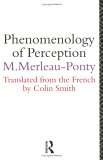In Phenomenology of Perception, Maurice Merleau-Ponty examines the different associationist and intellectualist conceptions of perception. He rejects both of them on the grounds that they establish an overly rigid relation between stimulus and impression, and secondly, because the world is not entirely the work of a constituting subject. The body is not one object among many, he suggests, but rather it is our means of belonging to the world, and facing tasks. He compellingly argues that body is not geometrical, but conveys a spatiality of situation, an orientation toward a possible world. The “body image” is fully interrogated, and gesture, speech, and sexuality are presented as modes of expression that accrue meaning in relation to one another.
The strength of M. Merleau-Ponty’s masterly work lies in his concluding thoughts on Being-for-itself and Being-in-the-World. In elaborating this distinction, Merleau-Ponty’s avoids the trappings of solipsistic reasoning, and makes a classic case for the field of Being- in-the-World’s and Being-for-itself radical interdependence, an independence which i which is perceived has no absolute basis that is theoretically divorceable from quotidian practices. Yet, he suggests, there is never certainty, even in the inner life. Only retrospectively can calm, serenity of being be illusorily achieved as subjects are constantly in a process of self-constitution. He concludes that we choose our world, and our world chooses us.




